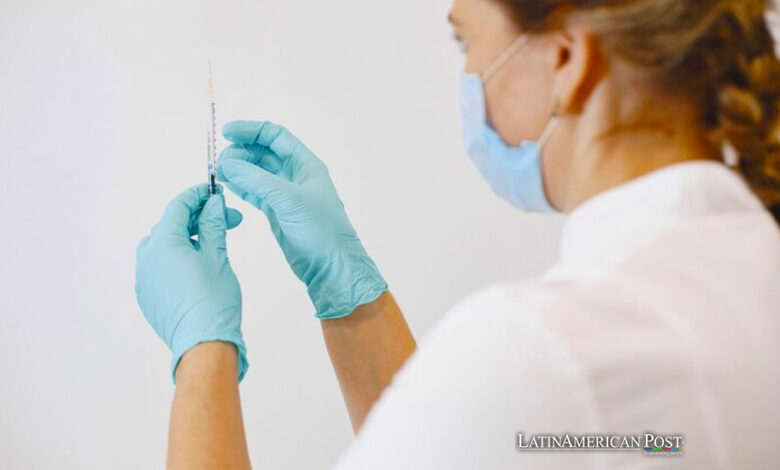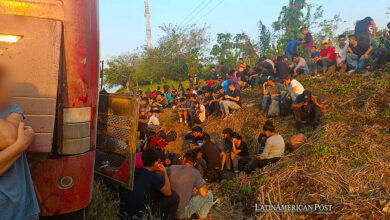Bolivia Confirms First Measles Case in Seven Years, Sparking Vaccination Push

The return of measles to Bolivia after a seven-year absence has health authorities on high alert. The confirmed case of the highly contagious disease in a seven-year-old girl highlights the importance of vaccination programs. It raises concerns about potential outbreaks in a region with fluctuating immunization coverage.
The Bolivian Ministry of Health’s announcement of a confirmed measles case marks a worrying development after decades of successful disease control. The infected girl, residing in Bermejo, a town bordering Argentina, had recently visited El Alto, a major city near the capital of La Paz. Ongoing investigations aim to determine if the case originated within Bolivia or was imported from Argentina, which has experienced recent measles outbreaks.
Minister María Reneé Castro underscored the urgency for action regardless of the source. She pleaded with parents to vaccinate their children, particularly those under five, as measles remains one of the most transmissible viruses. A single infected person has the potential to infect up to 90% of unvaccinated individuals in their proximity.
Bolivia’s measles-free status, maintained since 2020, has been a point of pride. The nation implemented an epidemiological alert in January of this year in anticipation of potential cross-border transmission, and authorities are now stepping up response measures. These include targeted vaccination drives in Bermejo and El Alto and public awareness campaigns.
The Dangers of Measles
While often dismissed as a simple childhood illness, measles carries severe risks. It spreads through respiratory droplets, causing symptoms like fever, cough, runny nose, and red eyes, followed by a characteristic rash. However, the complications can be devastating. Pneumonia, a potentially life-threatening lung infection, is common. Encephalitis, or brain inflammation, can lead to permanent neurological damage. In severe cases, measles can even be fatal, especially in young children and those with compromised immune systems.
Globally, despite a safe and effective vaccine, measles remains a significant public health threat. In 2021 alone, an estimated 9 million people were infected, resulting in over 120,000 deaths worldwide.
The Latin American Context
The reemergence of measles in Bolivia raises concerns within the broader Latin American context. While the region achieved the remarkable milestone of measles elimination in 2016, recent years have seen alarming declines in vaccination coverage. The COVID-19 pandemic significantly disrupted routine immunization programs, leaving many children vulnerable to preventable diseases.
The Pan American Health Organization (PAHO) warns that falling vaccination rates create conditions ripe for measles outbreaks. Neighboring countries like Venezuela and Brazil have experienced a significant resurgence of the disease, putting neighboring nations like Bolivia at heightened risk. Ongoing cross-border travel and migration can easily facilitate the spread of infectious diseases across regions.
Bolivia’s proactive response, including the early epidemiological alert and swift action upon case confirmation, demonstrates a commitment to protecting its population. However, this situation underscores the fragility of hard-won gains in disease control and the importance of maintaining high vaccination coverage.
Measles Eradication – A Constant Effort
Eradicating a disease as contagious as measles requires sustained, globally coordinated action. The measles vaccine, which provides lifelong immunity after two doses, has proven to be an invaluable public health tool. The goal of regional elimination was a major success story for Latin American countries, but achieving and maintaining this status demands continued vigilance.
Addressing gaps in immunization coverage is crucial, particularly in marginalized or hard-to-reach communities. Strengthening public trust in vaccines and combating misinformation campaigns that fuel hesitancy are vital components of an effective measles control strategy. Cross-border cooperation, including information sharing and coordinated vaccination efforts, will be critical in preventing regional outbreaks.
Also read: Bolivia’s Battle Against Seasonal COVID-19 Outbreaks is A Year-Round Challenge
Bolivia’s confirmed measles case is a stark reminder that the fight against highly infectious diseases is never truly over. Constant effort, unwavering commitment to vaccination, and proactive surveillance are essential to protect the health of populations throughout Latin America and beyond.





